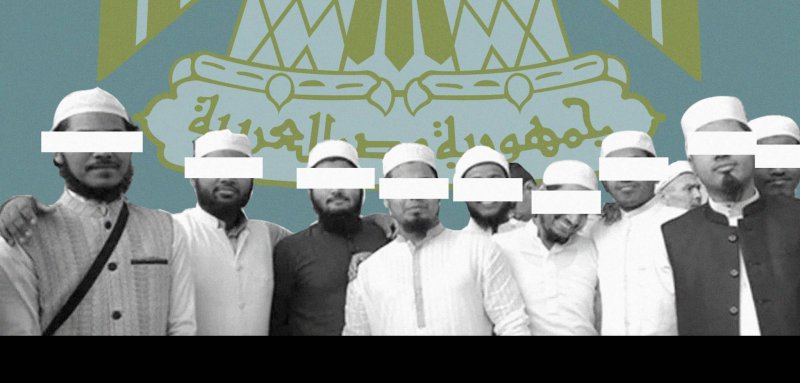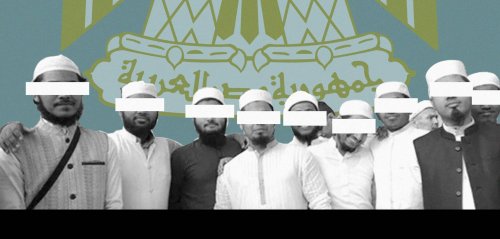They speak Arabic fluently; most of them attend the prestigious al-Azhar University in Cairo; they are largely based in the Nasr City district of Cairo. When the Uyghurs fled China’s oppression, they did not expect that Egypt – the country they sought refuge in because it is a "Muslim state", to use their expression – would arrest them one day at the request of the Chinese authorities - allowing Chinese officers to interrogate them.
There are no official statistics on the number of Uyghurs in Egypt. Raseef22 spoke to one Uyghur student studying Sharia (Islamic law) at al-Azhar University, who said that Egypt hosts hundreds of them, with the majority living in Nasr City – and more specifically its Seventh Neighborhood – mostly because it is near al-Azhar.
It should be noted that al-Azhar University is the largest Egyptian university in terms of number of foreign students, it is a destination for Muslim students from all over the world studying Sharia Law.
The student – who preferred to remain anonymous – also said that most Uyghurs work in restaurants owned by them in Nasr City, while those who do not work there tend to be employed in the field of sales in other outlets spread-out through the district – mostly in the sale and repair of mobile phones – while affirming that many Egyptian business-owners prefer to employ Uyghurs because of their reputation of being highly trustworthy and professional. Yet at the same time, the student affirms that many Egyptians do not know the word Uyghur or its meaning, revealing that he often presents himself to Egyptians as a 'Muslim from Turkestan.'
Indeed, the Uyghur student refuses to speak of the crises they experience in Egypt, declaring: "We do not speak about politics; the Uyghur chose to live in Egypt because it is a Muslim state."
The Uyghurs are Muslims who form around 45% of the population of the province of Xinjiang; they are a Turkic people (from the central-Asian region known as Turkestan) and often consider themselves racially and culturally close to the nations of central Asia. The United Nations repeatedly expressed its concern about the fate of the Uyghurs after the dissemination of reports of mass arrests of the community in China, calling on the Chinese government to release those detained in so-called "anti-terrorism" camps.
The Uyghur came to Egypt to escape China’s oppression, only to find the state arresting them and handing them over to Chinese officers to interrogate them
An Uyghur in Cairo: We know that if we return to China we will be arrested and tortured on the basis of inciting the spread of ideas that China describes as separatist.
"The Egyptians do not treat us as tourists, but as Muslims" says another Uyghur student to Raseef22, explaining that he came to Cairo in 2017, to be followed two months later by his mother and sister, adding that Egyptians have treated him with great amity and friendliness and do not harass him, explaining that his beard makes everyone treat him as a Muslim student like most Egyptians.
This student – who works in a bookstore selling theology books in Nasr City – also refused to talk of the Egyptian security's engagement with him, saying: "I am here to study and not to speak about political issues."
Beijing denies reports of conducting violations and abuses against the Uyghurs, but admits detaining some it describes as 'religious extremists' in order to "rehabilitate" them. China also accuses what it describes as Islamic extremists and separatists of causing disturbances in the region.
On the 18th of August, the Agence France-Presse (AFP) reported on the case of a Uyghur student in Egypt who affirmed that he was interrogated at the hands of Chinese officials in Egypt while blindfolded and handcuffed, after being stopped by Egyptian police in 2017. The student reported that the Egyptian authorities stopped him in broad daylight while he was with a group of friends, before taking him to a police station in Cairo where he was asked what he was doing in Egypt by Chinese officials – who he said spoke to him in Chinese and addressed him with his Chinese rather than Uyghur name.
Days after his interrogation in the Nasr City police station, the student was sent to the Tora prison, before being released after sixty days of detention. He has since fled to Turkey.
"Unwelcome in Egypt?"
In September 2016, the Egyptian Interior Ministry signed a technical cooperation agreement with the Chinese Ministry of Security; since the declaration of this agreement, the Uyghurs have only faced increased scrutiny in Egypt.
According to a report by the Egyptian Commission for Rights and Freedoms and the Association for Freedom of Thought and Expression – two Egyptian non-governmental organizations (NGOs) – the crisis of the Uyghur in Egypt began in July 2017, when Egyptian security forces arrested dozens during an expansive campaign, mostly students at al-Azhar.
The report which was titled "Unwelcome" revealed that the campaign began on the 3rd of July 2017, with an estimated number of 90 to 120 people arrested, especially in the Seventh neighborhood of Nasr City – with many of those detained being arrested in their restaurants, Uyghur-owned shops and homes, in addition to a further number detained by the police in the airports of Alexandria, Hurghada and Cairo, the seaport of Nuweiba and the roads leading to those ports.
At the time, reports circulated that Egyptian security forces deported 12 Uyghurs to China – only for this to be denied by Egyptian security in statements made to media outlets close to the regime. In 6th July 2017, Egyptian authorities placed at least 12 Uyghurs on board of an airplane heading to China, according to a report by the New York Times citing Egyptian officials, with the officials disclosing to the US newspaper that the police ordered them to deport the Uyghurs without giving any explanation.
At the time, a security official justified the campaign against the Uyghurs in a statement to the Al-Masry Al-Youm newspaper (close to the regime) that the campaign came "in the framework of natural security procedures conducted by the security apparatus in the country to inspect the residency of foreigners, and that the preliminary investigations and inspection of the papers of those arrested attested that a number of them contravened the conditions for staying in the country."
Furthermore, during the start of the crisis, the al-Azhar University denied news of the arrest of its Uyghur students, affirming in a statement that "what is being circulated in a number of news sites and social media sites is being followed-up with the relevant authorities, [while] noting that some news and numbers being broadcasted by some sites and channels in this regard are completely inaccurate." Yet on that same night, the consultant for the Grand Imam of al-Azhar, Mohammed Mehni, confirmed in a statement to a television program that "43 Uyghurs have been arrested including only three studying at al-Azhar."
In the past few years, the Egyptian security forces raided the 'Aslam' restaurant in the Seventh Neighborhood area of Nasr City – which is owned and mostly operated by Uyghurs – arresting dozens of those in it. Raseef22 reached out to the restaurant but its employees refused to talk of what they have been facing in Egypt during the recent period out of fear of harassment by Egyptian security forces. It should be noted that many Egyptians frequent 'Aslam', because of its low prices and high-quality Chinese food.
According to four different testimonies obtained by the Egyptian Commission for Rights and Freedoms and the Association for Freedom of Thought and Expression from Uyghur individuals who are still in Egypt or have been able to leave to Turkey, Chinese investigators were able to interrogate a number of detained Uyghurs in their places of detention held by the Egyptian government, including detainees at Tora prison, while one testimony also attested the torture of some detainees during the investigations.
One Uyghur site would report the statements by a Uyghur student living in Egypt: "There are hundreds of us here, we study in Egypt, we came to learn Islam in al-Azhar University, some of us have brought our families with us to escape from China," adding: "we know that if we return there we will be arrested and tortured on the basis of inciting the spread of ideas that China describes as separatist," proceeding: "Turkestan is a Muslim province and China occupied it tens of years ago, but this does not give it the right to tighten down on the population, and so we seek autonomy, and that is our right."
The student adds: "Some of us are looking for a safe way out of Egypt out of fear for our fate," affirming that some were lucky enough to escape to Turkey or Malaysia. With a heart-felt plea, he concludes: "I don't want to return to China, my papers are valid, I am still a student and I have not attained my university degree; I don't know why we are being treated like this by the Egyptian officials."
Raseef22 is a not for profit entity. Our focus is on quality journalism. Every contribution to the NasRaseef membership goes directly towards journalism production. We stand independent, not accepting corporate sponsorships, sponsored content or political funding.
Support our mission to keep Raseef22 available to all readers by clicking here!
Interested in writing with us? Check our pitch process here!






